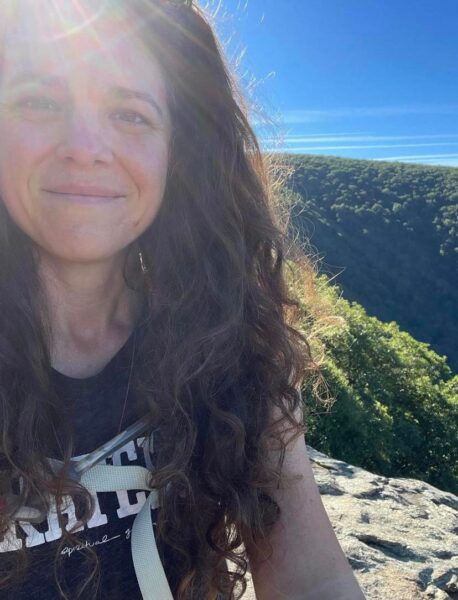More and more writers, especially those who identify as women, are writing about the joys and nuances of mid-life and desire. Why do these stories need to be told? What’s at stake in the telling?
I turned to my girlfriends, all of whom are so smart and strong and sexy, to talk about this question. It felt like a question that shouldn’t be attempted alone. We know women’s desire has been ignored, misunderstood, distorted, regulated, censored. Even by us. The worst is when we do it to ourselves. When we say “yes” when we mean “no,” when we stay silent when we want to scream (in agony or ecstasy). But we all agreed that, in getting older, we have fewer fucks to give. There is liberation in aging. We are letting go of our inhibitions, our insecurities, our inclination to prioritize others and to abandon ourselves. We can claim space, we can be selfish, we can choose pleasure. I like to say I’m in my DNGAF phase of life. I want to show up authentic, or I don’t want to show up at all. And part of showing up authentically is that I have (am?) a body. I carried a child, my joints ache after a long run, and … I am full of desires. Sometimes those desires exceed their bounds and spill out onto the page. My body has been speaking to me for so long. I am finally listening. These experiences deserve open, honest expression, without the trappings of shame. When women share, we feel less isolated, less alone. What a gift.
This short essay meditates in part about how being desired by an eighteen-year-old man empowers yet deflates the late thirty-something narrator because she foresees the fate of this young man. Is Anthony doomed to become the lamb-biryani or pineapple-jizz guy? Or might he hold onto some of his innocence and sweetness in the future?
I think we all, as we get older, inevitably encounter what I called the “loose gravel of life.” People we love die, opportunities pass us by, our bodies wrinkle and sag. There is quite a bit of joy, of course, so much to be grateful for. But life, viewed a certain way, is also a series of accumulating losses. And, the longer we live, the more there are. I’m not sure Anthony is doomed so much as he will, invariably, face difficulties that will harden him. But there is wisdom in this hardening. And I do believe it’s possible to retain some childlike joy, some earnestness and appreciation for the various wonders that life has to offer. I’m sitting now on the same porch where Anthony and I met. Green buds are sprouting on the dogwood tree in my front yard. My neighbor’s wind chimes are calling. My feet are warming in the sun. I hope Anthony will still be able to find and create beauty in the world, even after experiencing a bit more of it.
If this essay had a playlist, what songs would you include for our bead-lizard-making postal worker?
It never occurred to me to wonder what plays in those trucks all day long. What a great question! Maybe I could invite our postal worker to join me as I listen to songs about time passing? Anthony, pay special attention to that first song: “Do you remember how it feels to be young? / It feels great, motherfucker.”
“Feels Great”—Cheat Codes (ft. Fetty Wap & CVBZ)
“100 Years”—Five for Fighting
“If We Were Vampires”—Jason Isbell and the 400 Unit
“Have a Heart”—At 1980 (ft. Josh Dally)
“Why Worry”—Dire Straits
“Handwritten”—Gaslight Anthem
“Shot at the Night”—The Killers
“Meet Me in the Woods”—Lord Huron
“I Ain’t Worried”—OneRepublic
“Learning to Fly”—Hills x Hills
“Waiting on the Summer”—VHS Collection
“I Don’t Live Here Anymore”—The War on Drugs
The humor you weave throughout this piece is incredible. Who are your comedic inspirations?
I’m glad you said this, because the other day I brought my daughter to one of my classes, and afterward, she said, “Mom, I noticed that none of the students laughed at your jokes …. Were you embarrassed?” She doesn’t think I’m particularly funny, so I’m sure this was confirmation of something she’s long suspected. I grew up watching the brightly lit, twenty-three-minute comedies of the nineties, and sometimes I still hear Chandler’s voice in my head. Nowadays, I like watching clips of Key and Peele (I wish the world they created in “If We Treated Teachers Like Pro Athletes” was real) and Taylor Tomlinson. Taylor is so good at opening up about the difficulties of life and turning them into something we can all laugh at. (In Quarter-Life Crisis, she says, “Have you guys realized your parents messed you up yet? Have you found that stray dent in your head? ‘What happened there?’ They’re like, ‘We did our best. That’s what happened there. You were slippery, so …’.”) Life is a lot more bearable if you can turn everything into a joke. Even the hard stuff. Especially the hard stuff. Sometimes all we can do is laugh.
Reading your creative nonfiction made me think about Jack Gilbert’s poem, “Failing and Flying.” Gilbert begins his poem about divorce with the line, “Everyone forgets that Icarus also flew.” In your conclusion, you share all the ways you’ve soared in love. How and why did you choose this ending?
What a beautiful poem. His “The Butternut Tree at Fort Juniper” is one of my favorites. I think I wrote this ending because I needed the reminder that my life wasn’t totally bereft of love. That I’ve had some really beautiful experiences. That I don’t know what waits for me beyond the bend. I needed some hope. I was writing toward that hope. To summon it into existence, perhaps. None of us knows what lies ahead. Life is inexhaustible in its possibilities. I think we all need this reminder sometimes.



 The SmokeLong Grand Micro Contest (The Mikey) is now an annual competition celebrating and compensating the best micro fiction and nonfiction online.
The SmokeLong Grand Micro Contest (The Mikey) is now an annual competition celebrating and compensating the best micro fiction and nonfiction online.